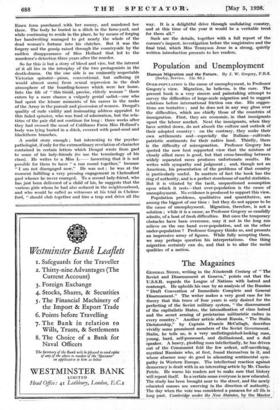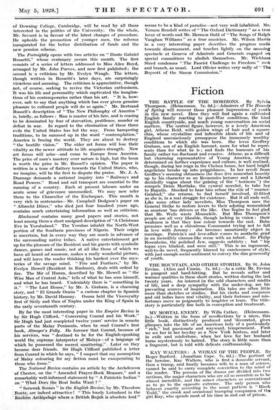The Magazines
GENERAL STONE, writing in the Nineteenth Century of " The Soviet and Disarmament at Geneva," points out that the U.S.S.R. regards the League of Nations with hatred and contempt. He upholds his case by an analysis of the Russian " Draft Convention of Immediate Complete and General Disarmament." The writer makes a very good case for his theory that this truce of four years is only desired, for the perfecting of the Soviet military system, " the disarmament of the capitalistic States, the intensification of class hatred and the secret arming of proletarian militaristic cadres in every country." Another article about Russia, " The Stalin Dictatorship," by Captain Francis McCullagh, describes vividly some prominent members of the Soviet Government. Stalin, he tells us, is a very undistinguished-looking man, young, hard, self-possessed, and disillusioned, and a dull speaker. A heavy, plodding man intellectually, he has driven out of the Communist fold the few ardent, self-sacrificing, mystical Russians who, at first; found themselves in it, and whose absence may do good in alienating sentimental sym- pathy in Western Europe. The intellectual reaction against democracy is dealt with in an interesting article by Mr. Charles Petrie. He warns his readers pot to make sure that history will repeat itself. In a certain sense everyone is now educated. The study has been brought near to the street, and the newly educated masses are swerving in the direction of authority. The day when the vote was considered a panacea for all ills is long past. Cambridge under the New Statutes, by the Master of Downing College, Cathbridge, will be read by all those interested in- the politics of the University: On the whole,
Mr. Seward is in favour of _the latest changes of procedure. He upholds the promotion of younger men, the reforms inaugurated for the better distribution of funds and the new pension scheme.
The Fortnightly opens with two articles on." Dante ,Gabriel Rossetti," whose centenary- occurs this month; The first consists of a series of letters addressed to Miss Alice Boyd, arranged by Mr. John Purves, and now first published ; the second is -a criticism by Mr. Evelyn Waugh. The letters, though written in Rossetti's later days, are surprisingly vivacious and amusing. The criticism is appreciative, though not, of course, seeking to revive the Victorian enthusiasm. It was his life and personality which captivated the imagina- tions of his contemporaries rather than his art. " It is, how- ever, safe to say that anything which has ever given genuine pleasure to cultured people will do so again." Mr. Bertrand Russell's description of " The New Philosophy of America " is, briefly, as follows : Man is master of his fate, and is ceasing to be dominated by fear of starvation, pestilence, murder or defeat in war. In regard to the elimination of these three evils the United States has led the way. From hampering traditions, to be summed up in, the word " contemplation," America is freeing the world. They are about to destroy " the beatific vision." The older art forms will lose their vitality as the newer attitude to life acquires strength. New art forms will arise—and come to Europe from America. The price of man's mastery over nature is high, but the boon is worth the price in Mr. Russell's opinion. The paper is written in a tone of flattery towards the United States, who, we imagine, will be the first to dispute the praise. Mr. J. A. Dunnage demands a national inquiry into " Railways and Road Powers." Road and rail transport are essential to the running of a country. Each at present labours under an acute sense of grievance unremedied. We may now refer them to the Chancellor of the Exchequer. This month is very rich in centenaries—Mr. Campbell Dodgson's paper on " Albrecht Darer," who died just four hundred years ago, contains much entertaining information as well as criticism.
Blackwood contains many good papers and stories, not least among them a short unsigned description of "A Christmas Eve in Yorubaland." The Yorubas inhabit the North-West portion of the Southern provinces of Nigeria. Their origin is uncertain, but in every way they are much in advance of the surrounding native tribes. A native entertainment got up for the pleasure of the Resident and his guests with symbolic dances, games and music, not at all like those of which we have all heard ad nauseam, makes a really wonderful picture, and will leave the reader thinking his hardest over the mys- teries of the savage mind. " Fire and Feathers," by Mr. Evelyn Howell (Resident in Kashmir), deals with ordeal by fire. The Mir of Hunza, described by Mr. Howell as " the Wise Man of Central Asia," tells of what he has seen himself, and what he has heard. Undeniably there is " something in it." " The Last House," by Mr. A. Graham, is a charming story, and " El Grande Osuna " a curious chapter in Spanish history, by Mr. David Hannay. Osuna held the Viceroyalty first of Sicily and then of Naples under the King of Spain in . the early seventeenth century.
By far the most interesting paper in the Empire Review is by Sir Hugh Clifford, " Concerning Conrad and his Work." Sir Hugh had just completed twelve years' service in remote parts of the Malay Peninsula, . when he read Conrad's first book, Almayer's Folly. He foresaw that Conrad, because of his services, was " destined to be for the -English-speaking world the supreme interpreter of Malaya—of a -language of which which he possessed the merest smattering." Later on they became dear friends. Sir Hugh Clifford published a letter from Conrad in which he says, " I suspect that my assumption of Malay colouring for my fiction must be exasperating to those who know."
The National Review contains an article by the Archdeacon of Chester, on the fr` Amended Prayer-Book Measure," and a remarkably well-informed statement by " A Patriotic Indian " on "What Does the Real India Want ? "
" Sarawak Scenes " in the English Review ;by Mr. Theodore Ruete, are indeed attractive ! " This lonely Lotusland in the Eastern Archipelago where a British Rajah is absolute lord" seems to be a kind of paradise—not very well inhabited. Mr. Vernon Rendall writes. of- " The Oxford Dictionary " as a true lover of words and.Mr. Hermon Ould of " The Songs of Ralph Vaughan Williams " as a true musician. Mr. Wilson Harris in a very interesting paper describes the progress made towards disarmament, and touches lightly on the amusing spectacle at Geneva of Admirals and Generals engaged on special committees to abolish themselves. Mr. Wickham Steed condemns ".The Fascist Challenge to Freedom " root and branch, as usual. Lord Olivier writes very sadly of The Boycott of the Simon Commission."









































 Previous page
Previous page